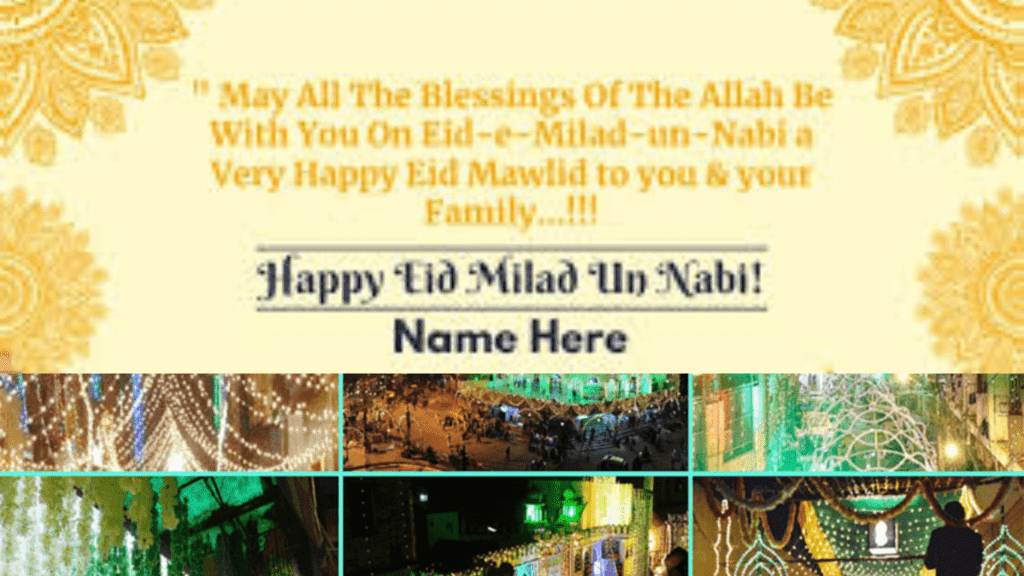Overview

https://inspirationalpositivequotes.com/wp-admin/edit.php?action=rank_math_instant_index_post&index_post_id=3092&method=bing_submit&_wpnonce=84e2aa261eMilad-un-Nabi Millions of Muslims throughout the world commemorate Milad-, also known as Eid-e-Milad, as a prominent Islamic holiday. The Prophet Muhammad (peace be upon him), who is regarded as the last messenger of Islam, was born on this day in history. The event is deeply spiritually and culturally significant, serving as a reminder to the Muslim community of the teachings, principles, and contributions made by the Prophet to humankind. This page delves into the origins, meaning, and practices surrounding Milad- providing insight into the celebration of this day and its continued relevance for Muslims worldwide.
The Milad-un-Nabi historian
Mawlid, also known as Milad- has its roots in the early history of Islam. In 570 AD, on the twelfth day of Rabi’ al-Awwal, the third month in the Islamic lunar calendar, the Prophet Muhammad (PBUH) was born in Mecca. Most Muslims celebrate this day as a celebration of his birth, while some Islamic scholars disagree over the precise date.

In the past, Milad- was observed for centuries following the passing of the Prophet. Large-scale public celebrations honouring the Prophet’s birth are attributed to the Fatimid Caliphs of Egypt. The practice grew throughout the Muslim world throughout time, with each location creating its own customs and methods of remembering the day. Milad-is commemorated today.
How Important Milad-un-Nabi Is
Muslims observe Milad-un-Nabi with tremendous significance because it is a day to commemorate and consider the teachings, life, and character of the Prophet Muhammad (PBUH). The Prophet is revered by Muslims as a spiritual guide as well as a role model of justice, compassion, and piety. Islamic laws, ethics, and values are based on his teachings.

Muslims from throughout the world take a moment on this day to give thanks for the advice the Prophet gave, emphasising the value of prayer, peace, social justice, and compassion for all people. Milad-un-Nabi reminds us to try to live up to his ideals and emulate him in every aspect of our lives.
How is Milad-un-Nabi observed?
Observance of Milad-un-Nabi varies based on local and cultural customs. However, Muslims all around the world follow a few basic traditions. Among them are:
Reading aloud from the Holy Quran: Reciting the Quran is one of the main events of Milad. Muslims meet in houses or mosques to study and consider the lessons found in the holy book that relate to the Prophet. Verses that emphasise the attributes of the Prophet and his mission are given particular attention.
Poetry and Naats in Honour of the Prophet: Many individuals take part in events during Milad-un-Nabi when naats, or poetry honouring the Prophet, are recited. These passages honour the Prophet’s life and characteristics, calling for love andCharity & Acts of Kindness: Muslims take this opportunity to give back to their communities in the spirit of the Prophet’s teachings. Many decide to help those in need by giving food, cash, or clothing. Additionally, some people perform deeds of kindness, giving of their time and energy to assist the less fortunate.
Parades and Processions: To commemorate the anniversary, public processions are held in several nations. These processions, in which participants hold banners, sing hymns, and distribute candy, are frequently bright and animated. A celebratory mood is created by lighting up the mosques and decorating the streets with lights.

Lectures and Sermons: The life and teachings of the Prophet Muhammad (PBUH) are the subject of lectures and sermons given by religious experts. These talks encourage Muslims to adhere to.
Unification in the Muslim World and Milad-un-Nabi
Even though Milad is a popular holiday, not all Muslims celebrate it in the same manner. Certain Islamic factions, mostly from the Sunni and Salafi traditions, contend that celebrating the Prophet’s birthday is an invention that neither the Prophet nor his direct adherents engaged in. Rather than honouring the Prophet’s birth, they think that real respect for him is found in doing as he taught.

On the other hand, a lot of Muslims from different traditions, including the Sufi and Shia groups, see Milad-un-Nabi as a chance to show their devotion and deepen their relationship with the Prophet. Notwithstanding these variations, the celebration of Milad-un-Nabi continues to bring Muslims together to commemorate and honour the Prophet Muhammad.
In summary
The commemoration of the birth of Prophet Muhammad (PBUH), known as Milad, is a day that holds immense spiritual significance for Muslims around. It provides a chance to consider the lessons of the Prophet and his ongoing influence on humanity. In addition to attempting to live up to the Prophet’s ideals in their everyday lives, Muslims show their love and admiration for him via recitations, almsgiving, and community events. Whether observed via processions, poetry, or prayer, Milad-un-Nabi serves as a reminder of the Prophet’s function as a light of hope, kindness, and wisdom for all of mankind.
